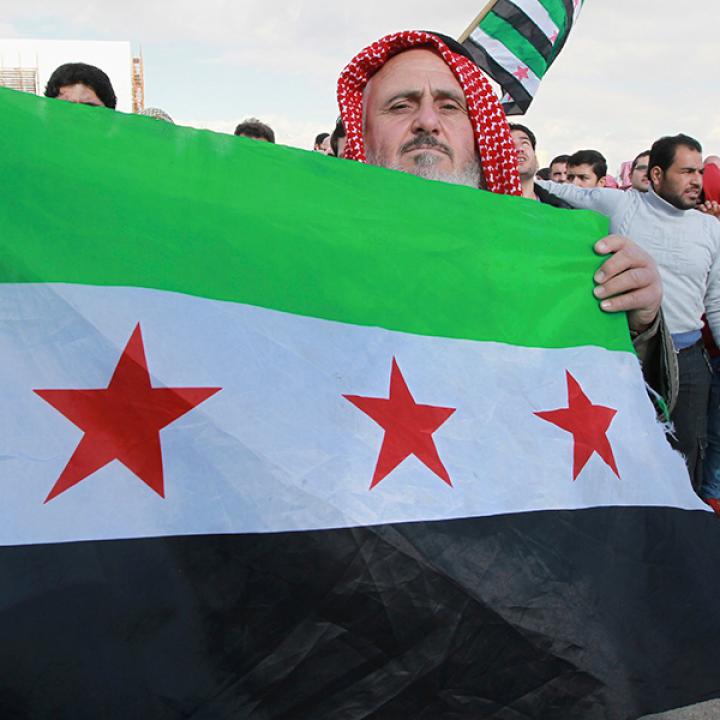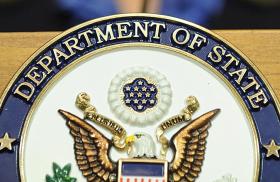
- Policy Analysis
- Fikra Forum
The Role of Syrian Tribes: Betting on a Lost Cause

Northeastern Syria is often described as a “clan-based society” due to its large number of Arab tribes. These tribes are transnational, extending beyond Syria’s borders to include Jordan, Iraq, and the Gulf. Until recently, analysis of the Syrian uprising often prioritized the sectarian dimension over the tribal one. Yet the Syrian revolution first broke out in Daraa, a mostly tribal region, and the revolution has had a major impact on Syrian tribal structure, albeit a mostly negative one. The conflict has done much to tear apart Arab tribes, a majority of which are Sunni Muslim. At the same time, it has also presented an opportunity for religious and ethnic minority tribes, including Kurdish, Turkmen, Alawite, Druze, and Christian tribes, to develop a more robust position within the current landscape. Thus, it is important to understand that despite the important earlier role tribes played in the conflict, this same war has eroded their authority to the point that they should no longer be viewed as effective political brokers in Syria.
Syrian tribes have historically played a crucial role in the country’s social and political landscape. During Ottoman rule, tribes were encouraged to manage various regions. Tribal leaders were granted titles, monetary support, and arms in order to strengthen the control of the central administration and to ensure ground support of military contingents. The role of the tribes in managing their areas of influence decreased during the period of French rule in Syria (1920-1946), a trend that continued during the period of independence. After independence, the number of tribal representatives in parliament was reduced from nine to six representatives. This weakening of tribal power culminated in the repeal of the “Law of Tribes” during the rule of Gamal Abdel Nasser under the short-lived union with Egypt as the United Arab Republic (1958-1961). The Law of Tribes was enacted by the French occupation in 1940 to provide some electoral and economic concessions to the tribes in order to gain their support to the French mandate.
When Hafez Al-Assad came to power in 1970, he adopted a somewhat different approach to dealing with the country’s tribes. While marginalizing the role of traditional leaders in political and social life, he also worked to replace those leaders with other individuals of lesser social and political standing. These new leaders were given posts in a number of security agencies and civil institutions, such as the Ministry of the Interior, the Ministry of Agriculture, and in positions serving the president, with the limitations of their previous social standings ensuring their support of the Assad family. Tribal representation has also increased in the Syrian parliament; today, 30 of 250 'elected' parliamentary representatives (12 percent) belong to Arab tribes.
Thus, Hafez’s son looked to the tribes to prevent unrest in Syria during the Arab spring. When Bashar Al-Assad visited the city of Raqqa in June 2011, he held an ancillary meeting with several sheikhs and tribal figures in the area and called upon them to stand with him in confronting those calling to bring down his regime—promising to offer any kind of support they requested. Nevertheless, the quickly developing situation ultimately culminated in the declaration of Raqqa’s liberation, the first Syrian province to shake off the control of Assad’s regime.
After Assad’s visit to Raqqa, the variety of military and political forces with an interest in influencing the outcome of the war began to reach out to tribes as one means of gaining on-the-ground support. Through this process, a large number of clan-based groups emerged, each expressing the same demands as their domestic, regional, or international backers. These forces in turn provided the clan structures with financial support and offered the necessary arms to supply the clans’ military factions.
When ISIS gained control over certain areas of northeastern Syria, for example, it quickly sought to enlist tribal support. ISIS announced the opening of the Office of Public Relations, a special office managing tribal matters. The primary task of the office was to assist with the dissemination of ISIS’s messages and decisions, in addition to providing help in recruiting youth to fight in their ranks. The office arranged a number of meetings with tribes in the region for this purpose, asking for their allegiance, exhorting them to fight by ISIS’s side after their major losses, and offering aid to militant elements as a result of “the small number of new recruits, and a decline in the influx of foreign militants.”
As the Syrian Democratic Forces (SDF) began to take control of formerly ISIS-controlled areas, the president of Syria’s Tomorrow Movement, Ahmed Jarba, called for an advisory meeting with the tribes in September 2017 in Cairo. This meeting produced the Arab Council for Jazira, a tribal group with some civilian activists. At the same time, Hemaydi Deham Al-Jarba announced the establishment of the “Forces of the Brave”/”Al-Sanadid Forces” to fight ISIS. This group included elements from the Shammar tribe to which both Ahmed Jarba and Haymadi Deham al-Jarba belonged. The Forces received support from the international coalition, while Saudi Arabia and the UAE backed the Arab Council for Jazira. The “civilian” councils loyal to the SDF founded what they called the “Council for the Tribes,” financially backed by the SDF, in order to promote their military and political project. This split along the lines of international backing within a single tribe helped erode the tribal authority that these international backers had hoped to take advantage of.
The Syrian regime also continued to work towards winning the support of tribes located in their areas of influence. The regime announced in late January 2019 that they had held a meeting with tribes in the Ithriyah region (125 km south of the Raqqa), stating that hundreds of tribal figures who supported the regime had attended. Also reportedly in attendance were several Iraqi tribal figures known to be loyal to Iran. Afterwards, a statement was released echoing the regime’s policy and manner of discourse on issues related to the eastern governorates of Syria.
Turkey has also acted to take advantage of tribes in the current Syrian landscape. It arranged a similar style of meeting with the last of the Syrian tribes in the border region of Azaz, followed by a meeting in the Sajo region, which was attended by about 150 tribal figures in addition to the president of the opposition coalition. This culminated with the announcement of the establishment of the High Council for Syrian Tribes and Clans and a Council of Elders, which consisted of 150 people. In the final statement from the meeting, the tribal sheikhs involved made statements echoing Turkey’s interests in the region and expressing support for a potential Turkish operation against the SDF while couching their letter in terms of continued support for the original principles of the Syrian revolution.
Thus, many of northeastern Syria’s tribes have become aligned with one or another of the war’ s different factions, loyal to groups with contradictory and conflicting goals. However, tribal participation also shares some commonalities: most tribes have suffered from the fragmentation of their internal structure at the hands of the Syrian regime, a process that has been in place since the elder Assad reduced the influence of existing traditional tribal leaders and replaced them with people from the lowest levels of the tribal order. These divided loyalties highlight the fact that it is no longer possible for a tribe coming together as a cohesive force–as is the case with Syrians as a whole.
And as with other Syrians, tribes have been dispersed to all corners of the Earth as refugees and displaced people. Thus a new reality has emerged, in which the people of a single tribe, and sometimes a single family, have conflicting allegiances: some loyal to the regime, some to the opposition, some to rival countries in the Syrian arena. This fluidity of loyalties has become a feature of the conflict that many studies view as a more permanent part of tribal culture.
During the war, tribal identity was further eroded as tribal leaders lost their credibility among a large sector of Syrians as many sided with the regime. Some even participated in security agencies that attacked the opposition. On the other hand, those leaders who did support the opposition were not able to effectively aid it or even gather their tribes together. Instead, some contributed to the corruption that became a distinguishing feature of the Syrian opposition. The tribes were also exploited by conflicting elements in Syria and only given renewed media attention when they were needed, which rendered promises of change nothing more than “words on paper.” As a result, the tribes lost confidence in what was going on around them, and even what they were directly participating in.
Due to these developments, it seems that any bets on the positive role of the Syrian tribes as a player in the country’s current conflict are bets on a lame horse. Moreover, the increasing frequency of research on the role of tribes supporting the main forces in the Syrian arena coincides with the failure of these forces to find convincing solutions to the Syrian crisis. At the same time, these forces have been unable to deliver on their promises on achieving their main goal of defeating the Assad regime and building a society based on dignity, civil freedom, and democracy. Thus, it seems to many Syrians that it would be most productive for the U.S. administration, in dealing with the Syrian issue, to turn their attention to supporting civil groups rather than focusing on tribal-affiliated entities. Civil support—rather than a continued reliance on eroded tribal power—is one of the few available options that may help in restoring stability after liberation from ISIS control.


